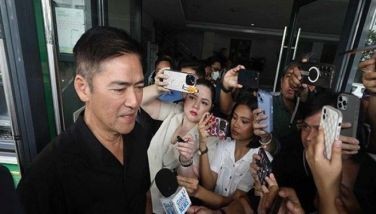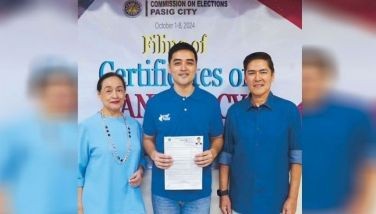Ka Freddie: Upclose and personal
November 10, 2005 | 12:00am
 After getting rejected by practically half of the music lounges in Metro Manila (he flunked every audition), Freddie Aguilar’s singing talent was finally appreciated when he tried it out at Cola House that used to stand in front of the National Library on T.M. Kalaw. He was such a hit with the audience that the club manager – who couldn’t understand why other lounges rejected him – hired him on the spot and made him a regular singer there.
After getting rejected by practically half of the music lounges in Metro Manila (he flunked every audition), Freddie Aguilar’s singing talent was finally appreciated when he tried it out at Cola House that used to stand in front of the National Library on T.M. Kalaw. He was such a hit with the audience that the club manager – who couldn’t understand why other lounges rejected him – hired him on the spot and made him a regular singer there.
In time, he also made the rounds of the other major folk houses in the metropolis – Bodega, Hobbit House, Copper Kettle, etc. His salary had doubled from his P25 a night take at Cola House to P50, quite a sum in those days.
The artist in him, however, ached for more. There was no more challenge singing in folk houses in Metro Manila. Upon the suggestion of a friend, he packed his bags and left for Olongapo City "where the really talented musicians are."
Freddie and another friend went there almost penniless because for all that huge pay he was making singing in different folk houses, he was unable to save – splurging his money mostly on barkada.
In Olongapo, he knocked on the door of every joint and to his disappointment found out that these establishments were only hiring female singers.
He was just about to give up when he decided to utter a prayer and when he looked up to offer it to the Almighty, he saw a streamer that said: "Singing tonight – Carol." It only said Carol. No surname. But deep in his heart, he knew that this was the same Carol he took under his wings before and trained as a singer when they were both still in Manila.
He needed Carol’s help. Anyone’s help. He and his companion were out of money. They went back to the same joint that evening to wait for Carol. But what if it’s not the same Carol? That fear bugged him all throughout. Meanwhile, at the lounge where this Carol was going to sing, they had to sit down and order beer. They only had enough money for one bottle, which he had to share with his friend.
When Carol finally came out, his heart leaped with so much joy and relief because it was Carol – his friend way back in Manila. So he quickly sent her a note through the waiter, who put it under a stack of requests – to Freddie’s utter frustration. That one bottle of beer had long been consumed between him and his friend and the waiters were already giving them the stare because they were bad business.
Finally, Carol was able to read his note, called him on stage to sing before an all-white audience. They liked him. Even the bar owner liked him – very much. But there was no vacancy yet for him. He was made to wait it out in Olongapo – with his accommodations paid for by the club owner.
But as fate would have it, he didn’t have to wait very long because the following day, the band that regularly plays in a sister club didn’t show up and he was made the permanent replacement. Freddie got P60 a night, but earned P200 in tips.
Freddie at this point was older, wiser – and more responsible. He was finally able to help out his family financially. He and his father had also settled whatever little misunderstanding they had before.
Olongapo had changed him. Olongapo to him was bliss. Unfortunately, this was to end soon. The band that got kicked out because of him apparently never forgave him for taking their place. Drugs were "planted" among his belongings and this was a no-no in the club. The planted evidence was soon discovered and it was Freddie’s turn to get kicked out.
Freddie had to leave Olongapo as a result of that frame-up. Back in Manila – in a rented room – he found himself fighting off boredom one afternoon. He turned on his small black-and-white TV set but found nothing interesting (this was way before the advent of cable). It was the same thing on radio. All boring stuff.
In one corner, he saw his dirty laundry all piled up. This would never have happened at home – what with his parents looking after him. Then he began to miss his folks and this inspired him to write a song that spoke of his appreciation for all the wonderful things his parents had done for him. It was also his way of asking for their forgiveness for all the heartaches he had caused them. In less than an hour, he had completed the lyrics and melody of what eventually became the now-legendary song Anak. This was in 1976.
After he had completed Anak, he asked his friends to listen to it and there came the suggestion for him to enter the song in the very first Metropop where it became one of the 14 finalists.
It was a long wait, however, for the grand finals because it was going to be a big night. Unfortunately, his father had died around this time (1977) and was unable to even hear the song – much less be witness to the fame that awaited his eldest son.
With his father gone, Freddie lost his interest in music. He had P1,000 (his prize for getting into the Metropop finals) and all he wanted to do with it was to open an electronics repair shop and be able to apply what he studied at Guzman Tech.
Before he could shift careers, however, the Metropop grand finals finally happened (in early 1978). No, he wasn’t really expecting to win because compared to the other composer-finalists he really had no formal training in music. He just came from the streets – he kept telling himself.
But other people had high hopes for Anak and were expecting it to win first prize. Even Imelda Marcos stood up to congratulate him after his rendition of the song. In the end, it was Ryan Cayabyab’s Kayganda ng Ating Musika that won first place and Anak didn’t win a single prize.
After losing in the Metropop, he thought his career in music was finished and was again all set to open an electronics repair shop. But Anak was soon released in the market and it turned gold in one week – selling 100,000 copies. By the second week, it had turned platinum – with 200,000 copies sold.
After a month, it was translated into Niponggo and, later, in various European languages. Today, Anak has 46 different versions all over the world. The latest translation – and this was only a few months ago – was in Vietnamese. In Japan, it is the second most requested song – next only to Frank Sinatra’s My Way.
In 1980, the success of Anak prompted an American talent agency to offer him a career in the US. Included in the package that was offered to him was for the agency to help him get a US citizenship and an assured income of $10 million in a span of 10 years in Hollywood. He eventually said no because that would have required him to sing and dance – and he only sings and plays the guitar, he told them. Moreover, no more Tagalog songs once he starts with his American career.
He doesn’t regret his decision. His career continued to flourish here in the Philippines anyway. (His Magdalena climbed the Billboard charts in 1983.)
And Anak – which is included in his latest album, The Best of Freddie Aguilar Live! – still continues to sell. (So far, it has sold four million copies worldwide.)
It is difficult to collect royalties, however, because there are so many to run after. Besides, some countries don’t even bother to pay royalty.
Also, Freddie Aguilar isn’t really the type to be splitting hair over royalties.
To begin with, Anak was written originally as his way of showing his gratitude to his parents and it has already fulfilled its purpose – almost.
If only his father had lived just a little longer to appreciate it and its worldwide success.
BrandSpace Articles
<
>
- Latest
- Trending
Trending
Latest
Trending
Latest
Recommended


































